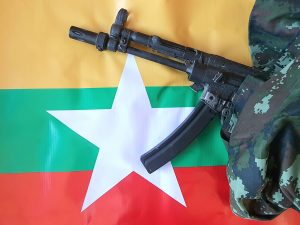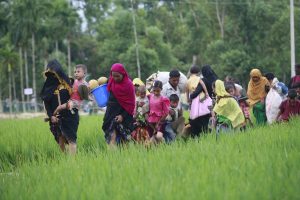Featuring A Success Story (FASS) – FASS-ARI Book Manuscript Workshops
March 10, 2022
The FASS-ARI Book Manuscript Workshops scheme is a joint initiative by the Faculty of Arts and Social Sciences (FASS) and the Asia Research Institute (ARI). The scheme will fund two, one-day book manuscript virtual workshops, with up to S$4,000 per workshop. These book manuscript workshops are intended as an intensive but supportive means of fine-tuning a book manuscript which is already close to completion. Invited reviewers will provide focused and informed criticism with the goal of turning a strong manuscript into an excellent submission.
 Assistant Professor Elliott Prasse-Freeman (NUS Department of Sociology) recently spoke to us about his upcoming monograph, Rights Refused: Activism, Violence, and Blunt Biopolitics amidst Myanmar’s Cursed Transition (Stanford University Press, forthcoming), supported by the FASS-ARI Book Manuscript Workshop. The book examines Rohingya political subjectivity amidst dislocation and mass violence, with a particular focus on their maneuvers in the context of post-sovereign governmental regimes that incorporate Human Rights discourse, humanitarian care/exclusion, and biopolitical regulation.
Assistant Professor Elliott Prasse-Freeman (NUS Department of Sociology) recently spoke to us about his upcoming monograph, Rights Refused: Activism, Violence, and Blunt Biopolitics amidst Myanmar’s Cursed Transition (Stanford University Press, forthcoming), supported by the FASS-ARI Book Manuscript Workshop. The book examines Rohingya political subjectivity amidst dislocation and mass violence, with a particular focus on their maneuvers in the context of post-sovereign governmental regimes that incorporate Human Rights discourse, humanitarian care/exclusion, and biopolitical regulation.
How did the Book Manuscript Workshop affect the writing of the book?
The first and under-appreciated benefit of the award is that it acts as a commitment device to get a draft done. A first book is the cumulation of a decade of work (setting up the dissertation, doing the dissertation research, and then turning it into a book), so it's hard to complete it, because there is so much pressure to do it right. And as a result there's a risk that it never ends. The book workshop provides a goal and a process to stop putting it off and get it done.
Second, any time you do something as big as a book, you want a number of people to look at it. But the problem is that you can run the risk of too many opinions pulling in opposing directions. But having a workshop with everyone in the same room - virtual or otherwise - allows an opportunity for a conversation about the options, and in the end you feel that everyone is pulling together.
Third, the intellectual heft that you can marshal together in one room provides insights into your book that you might not have seen, and this gets you excited to finish the thing. At the end of the two days you can see the finish line a lot more clearly than when you started.
What has been your experience with the book’s publication process?

I completed the manuscript in October (so six months after the book workshop) and submitted it to Stanford University Press. It is now in 'advanced contract,' which means that I have received positive reviews that nonetheless ask for revisions. So I will spend the next two months making revisions and it will go for review again. The review process has already made the book stronger, as the reviewers demonstrated interest in the project by reading it closely and working to help me make it better.
How did the workshop open pathways to future studies and/or collaborations?
I am not sure yet! But the tendency in a first book is to stuff everything in, and the book workshop participants encouraged me to hold some things out, so that they could be given more attention in future work.
What do you think were the strengths of your workshop application that led to it being accepted?
I had written and revised a book proposal a number of times, and so it was an effective distillation of my manuscript (at least at that point). Writing a book proposal is more challenging than I had expected, so focusing on that first made the application much easier.
Did you face any challenges putting the workshop together? If so, what did you do to overcome those challenges?

Logistics across time zones were difficult, but the online format worked much better than I had expected when I participated as a reviewer (for an earlier ARI book workshop held by ARI post-doc Andrew Ong in 2020) and so I was committed to getting everyone in the same (virtual) room together. This meant that Singapore participants had to be up very early (7am start) and so I am particularly indebted to them.
What do you think the workshop enabled you to achieve that you would not have been able to do without it?
It encouraged me to make bolder and more synthetic theoretical points, bringing together strands of analysis that until then had been more immanent than developed.
Thank you very much for sharing your experience with the FASS-ARI Book Manuscript Workshop, Elliott! We wish you the best in your current and future research projects!

